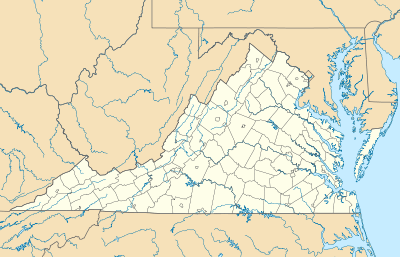Blue Ridge Farm (Upperville, Virginia)
|
Blue Ridge Farm | |
 | |
|
Blue Ridge Farmhouse | |
 | |
| Location | 1799 Blue Ridge Farm Rd., near Upperville, Virginia |
|---|---|
| Coordinates | 38°57′49″N 77°52′42″W / 38.96361°N 77.87833°WCoordinates: 38°57′49″N 77°52′42″W / 38.96361°N 77.87833°W |
| Area | 517 acres (209 ha) |
| Built | 1791 |
| Architect | Wood, Waddy Butler; Shipman, Ellen Biddle, et al. |
| Architectural style | Federal, Colonial Revival |
| NRHP Reference # | 06000753[1] |
| VLR # | 030-0894 |
| Significant dates | |
| Added to NRHP | August 30, 2006 |
| Designated VLR | June 8, 2006[2] |
Blue Ridge Farm is a historic home and farm located near Upperville, Fauquier County, Virginia.
Overview
The property includes of a two-story, rubble stone Federal era farmhouse known as Fountain Hill House (c. 1791) and its associated outbuildings and two contributing sites; a one-story Colonial Revival-style stone house known as Blue Ridge Farmhouse (1935) and its associated outbuildings, and formal landscape features around it; two tenant houses (Crawford House and Byington House, c. 1903); and several buildings associated with the farm’s horse breeding industry, including three large broodmare stables (c. 1903); two stallion stables (stud barns, c. 1913); training stables, and an implement shed.
The Blue Ridge Farmhouse was designed in 1933-1934 by Washington, D.C. architect Waddy B. Wood. Californian Henry T. Oxnard (1860-1922) built a horse breeding operation at Blue Ridge Farm in 1903.
Purchased by Rear Admiral Cary Travers Grayson in 1928, members of the Grayson family still own the property.[3]
It was listed on the National Register of Historic Places in 2006.[1]
References
- 1 2 Staff (2010-07-09). "National Register Information System". National Register of Historic Places. National Park Service.
- ↑ "Virginia Landmarks Register". Virginia Department of Historic Resources. Retrieved 5 June 2013.
- ↑ Kim Prothro Williams (April 2006). "National Register of Historic Places Inventory/Nomination: Blue Ridge Farm" (PDF). Virginia Department of Historic Resources. and Accompanying four photos

